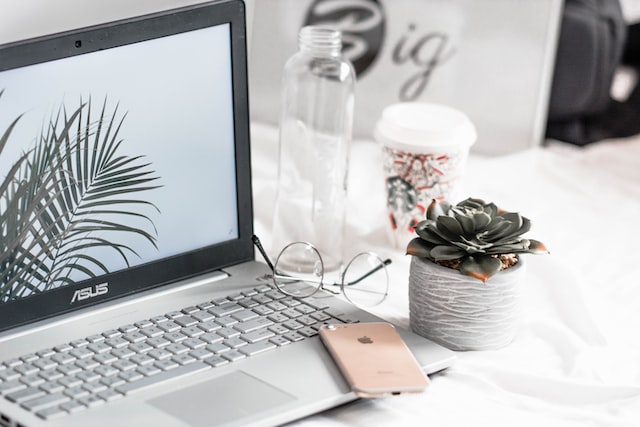All computers slow down over time. It’s a symptom of age, but you can learn how to restore your laptop or desktop to its former glory. Restoring a laptop to its optimal speed is relatively easy to do. A few programs will help, but your laptop already has the necessary tools built into it so that you can get started. The most important part of this process is clearing unused programs that slow it down. Then, your laptop PC or MacBook will work faster, and you’ll remember how great it feels to use a smooth-running system again — making your life easier and more efficient.
How to clean your hard disk to restore your laptop
Installing programs can make a mess over time, but there are many effective ways to clean your computer and free up a lot of the space it needs to run efficiently. The quickest cleanup trick is to empty your recycling bin. When you delete files from the recycling bin, you’ll free up a lot of wasted space.
Slow laptops are most commonly a result of programs that run when you start the machine. If you access your task manager (run a search on the computer for it or use the classic “CTRL + ALT + DEL” option), you’ll notice a tab for start-up programs. Then, you’ll see a list of everything that runs when you turn your computer on. Disable all the non-essential programs so they no longer tax your system’s resources upon start-up. You can even go online and search programs you don’t recognize, so you don’t disable anything your computer needs. There are also some great online packages that will help you in your quest for faster internet.
While you’re focused on programs and apps, delete the ones you no longer use. You’ll be surprised at how many programs build up over time, so run a search for “uninstall programs” and go through the list. If you’re not sure about a specific program, perform a Google search to ensure you can delete it. Deleting old files and software cleanup practices will save a lot of space on your laptop.
When you install programs on computers, you create registries — which aren’t always deleted or cleaned correctly. Most anti-virus programs have a system optimization process that includes a registry cleanup, which you can try. You can also perform a “disk clean-up” on Windows – give it a search and use it to tidy things up. While using your antivirus software, run a “deep scan” or a “full scan” to ensure your laptop is free of viruses. Destructive malware, which your antivirus should catch, is the next biggest reason computers slow down.
Specialized cleanup apps

When cleaning your laptop, several excellent programs can assist you. These programs go through your laptop’s junk files, registries, and unnecessary files and delete them for you. The best program for revitalizing a laptop’s performance is CCleaner Professional. Before tracking it down, be aware that it’s not the most user-friendly. If you’re not handy with a computer, try IObit Advanced SystemCare, which features a more user-friendly interface.
Another great option is AVG Tuneup, which works best on multiple platforms if you want to protect your iPads, Androids, and Windows systems.
Choosing the right antivirus
Antivirus plays a pivotal role in keeping your computer clean, optimized, and free from viruses and other threats. When antivirus programs first entered the scene, it was enough that they merely prevented viruses. However, that’s only the tip of the iceberg in today’s ever-changing landscape. The threats that can hurt your laptop are growing, and a great antivirus suite has an answer for them.
The cost is the first significant factor you’ll want to consider in antivirus software. Several free services will protect your laptop from viruses, but free services don’t usually offer a full scope of protection. Investing in your cyber security is crucial as the world continually shifts towards a digital age. Many great antivirus software options will keep you safe and won’t break the bank. The best combines the highest costs into an all-inclusive package — such as pairing antivirus protection and VPN (virtual private network) usage.
You’ll also want your antivirus software to have a minimal impact on your machine’s resources. An antivirus that slows your laptop isn’t helpful – you should barely notice your antivirus software’s presence when you boot up your computer. These automated scans should be in the background of your work — so you won’t even notice them happening.
Your antivirus should also have tools that optimize your machine and identify threats to keep everything running smoothly. These services are compatible with multiple computers, which protect your family’s devices.
Why should I clean my hardware?

Most advice on optimizing your laptop is about deleting old programs and keeping your machine free of clutter. It should be no surprise that practicing healthy organization of your files makes a significant difference in keeping your laptop running at its best. If you store too much on your computer, it will struggle to run, but file organization will help you delete what you no longer need. Order versus chaos is the goal. Another excellent reason to optimize and clean out your laptop is that it will improve the performance of your device, opening up some fun possibilities like playing racing games with your web browser.
Now, everything will need home-categorized files to keep you organized. If you have no organization to start, consider having a work file, a personal file, a friends and family file, and a miscellaneous file. One way or another, everything should go into one of these places. Then, make sub-folders for similar things — like cat pictures and family photos.
Most of your files don’t need to be stored on our laptop’s hard drive, as we don’t use them often. Instead, buy an external hard drive and keep your photos and anything else you don’t use daily. This process will open up valuable space your machine needs by using a cloud storage system. You can even access it online between several devices. These storage systems, such as Google Drive, will let you store a few gigs for free. If you need more space, it’s worth paying for the storage. They act like hard drives – you simply move your files onto them, and voila! There are a few excellent cloud storage options available, so do some research for one that best fits your needs.
As you organize your computer, avoid renaming or removing files that your programs or laptop need to operate. It may be worth creating a restore point before you start your work so that if something goes wrong, you can go back to it. Don’t empty your recycling bin unless you’re sure you won’t need those files again. If you delete something you need, call a professional immediately to see if they can restore your data and repair your laptop.
It’s also smart to physically clean your laptop, as dirt can clog up the machine’s insides and slow it down. Use cotton swabs and compressed air to remove debris from clogged ports and the keyboard itself. A simple screen cleaner and a microfiber towel are perfect for external cleaning.
What can I do if my computer already has a virus?

If you have one currently, and you’re not computer savvy, shut your laptop down entirely and get help from a professional. Don’t give away any personal information while using that laptop. If you have some skills, follow this list to purge any virus from your system:
- Download antivirus software.
- Disconnect from the Internet.
- Reboot your laptop in Safe Mode.
- Perform a disk cleanup.
- Perform a full or deep virus scan.
- Quarantine or delete the virus.
- Reboot your laptop.
- Change all your passwords.
- Update your operating system and programs.
There’s no better feeling than a laptop working as if it were new. It takes some time to get it running optimally, but once you do the work, you’ll be glad you did. Your organized files and safer machine will make everything easier to do. And finally, you’ll extend your computer’s overall health so you can keep using it for the things that matter most.




